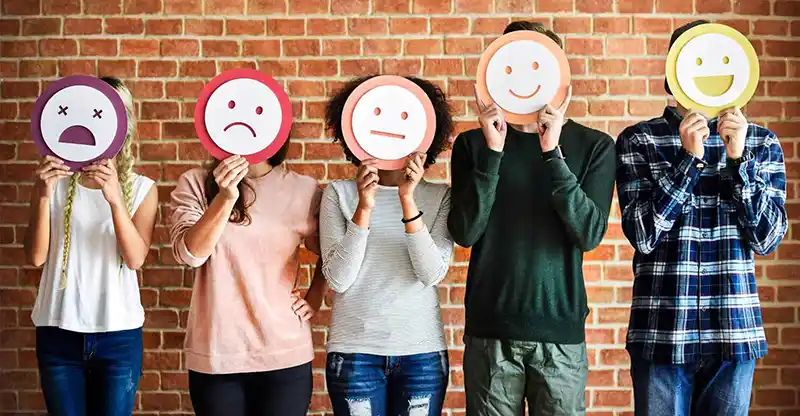Emotional health and mental health share intriguing commonalities yet differ in meaningful ways. Achieving harmony between one’s intellectual and affective spheres constitutes an ideal state of being. Given their intricate interrelation, some characteristics may converge. However, delineating the nuances between emotional and mental wellness imparts greater understanding of the human psyche.
What Is Mental Health?

Mental health constitutes a state of emotional, cognitive, and behavioral equilibrium that enables productive functioning across familial, social, and occupational domains, promoting wellbeing and quality of life. It primarily encompasses cognitive faculties like attention, memory, critical thinking, and reasoning. Mental wellness is characterized by sound decision making, interpersonal effectiveness, and the ability to work constructively.
Recommended strategies for optimizing mental health include:
- Maintaining physical health through exercise, nutrition, and adequate sleep.
- Cultivating optimism and gratitude internally and externally.
- Nurturing supportive, enduring relationships.
- Engaging in altruistic acts that confer meaning and self-worth.
- Seeking medical care as needed.
Mental health is vital across life stages from childhood through adulthood. Students warrant particular focus, as youth is a formative period. Biological factors like genetics and life experiences such as trauma can predispose individuals to mental health challenges. With proper support, these issues can be overcome.

The Value of Healthy Mental Function
Mental health refers to psychological wellbeing beyond merely the absence of illness. It denotes healthy cognitive, emotional, and behavioral function.
Robust mental health empowers individuals to:
● Maximize productivity in work, academics, and life
● Forge meaningful connections
● Actualize their potential
● Navigate inevitable challenges
● Contribute to community and society
● Adapt to change skillfully
● Achieve goals and find purpose
Safeguarding mental wellness is imperative, as psychiatric disorders grow increasingly prevalent. Imbalances manifest through disrupted sleep, appetite, energy, and sense of engagement. Cultivating self-awareness and resilience preserves the mind’s vitality amid stressors.
What is Emotional Health?

Emotional health denotes one’s capacity to regulate feelings and affect, especially during stressful or upsetting circumstances. Emotionally balanced individuals can accurately identify, healthily express, and adaptively manage their emotions across positive and negative life events. Unlike mental health, emotional wellness does not imply an absence of feelings. In fact, suppressing emotions is less healthy than skillfully articulating them.
Recommended strategies for fostering emotional health include:
● Recognizing and developing personal strengths
● Making time for rest and recreation
● Reframing challenges through a positive lens
● Maintaining close relationships
● Cultivating spiritual life through practices like prayer or meditation
Those with robust emotional health assertively control their feelings, have self-esteem, enjoy positive relationships, and implement resilient coping mechanisms for life’s difficulties. Emotional equilibrium is essential for human flourishing.
The Value of Healthy Emotional Function
The Mental Health Foundation defines emotional health as “a positive state of wellbeing enabling adaptive functioning and meeting daily demands.”
Alongside mental wellness, robust emotional health empowers individuals to:
● Maintain a healthy inner world
● Express feelings effectively
● Regulate emotions appropriately
● Experience general wellbeing
● Appreciate abstract ideals like art, beauty, joy and love
Physical and emotional health are intertwined, as chronic stress and negativity can engender other health problems. Not directly caused by emotions themselves, these issues arise from maladaptive behaviors influenced by poor emotional control. Tending to emotional equilibrium is thus integral for holistic wellness.
What Is the Difference Between Mental and Emotional Health?

Mental health and emotional health are distinct yet equally vital components of overall wellbeing.
- Information Processing vs. Emotion Expression
Mental health involves effectively processing information and experiences. Emotional health concerns managing and conveying emotions elicited by one’s cognition.
- Focus of Mental and Emotional Health
While mental health emphasizes cognitive functions like perception and decision-making, emotional health prioritizes expressing feelings adaptively.
- Scope
Furthermore, mental health encompasses emotional, psychological, and social wellness, whereas emotional health is more narrowly defined.
- Pathology as it Relates to Mental and Emotional Health
Mental illness includes more pathological conditions like mood disorders and schizophrenia. Emotional health frequently involves less severe issues like managing stress.
- Medical Support
Given its stronger ties to disorder, mental health relies more heavily on psychiatric and clinical psychological services. Emotional health issues, conversely, are often addressed through counseling or coaching. This divergence in medical support reflects the different domains mental and emotional wellness occupy.
The Relationship Between Emotional and Mental Health
Though distinct constructs, emotional and mental health are fundamentally interconnected. In the absence of mental wellness treatment, emotions can become dysregulated. Conversely, focusing solely on emotional health yields cognitive disorientation and functional impairment. Holistic rehabilitation must attend to both spheres.
Is it Possible for Your Mental Health to Change Over Time?
Mental health is dynamic, fluctuating over time based on various stressors. When demands overwhelm coping capacities, psychological wellbeing may suffer. Prolonged work hours, caregiving duties, financial strain, and other stressors can exact a toll.
Conclusion
In summary, while emotional and mental wellness differ in some regards, both are equally vital and symbiotic. Mental health governs inner cognition and processing, while emotional health regulates outward expression and conduct. Cultivating both domains mitigates maladaptive emotions and empowers purposeful, fulfilling lives. The mind and heart must be nurtured in tandem for optimal health.





